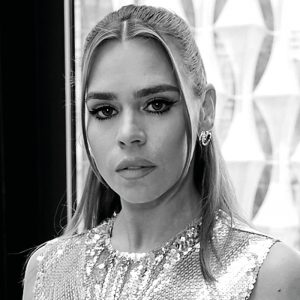You first started writing this 8 years ago, has it changed at all since, were any of the changes made in to the final film?
I started writing it when I was just leaving my 20s and into my early 30s, I had just had my second son, and that for me was a rude awakening I would say. I became very conscious of myself, the world around me. I became incredibly anxious. I felt like the culture messaging was that we as women could do it all and that we should and that we should do it really well, and that we’d be able to balance it all. And yet, all I could see around me was female crisis. I wanted to unpack that stuff in a very exposing way. Since then, how have things changed? I guess I have learned how to cope with anxiety. Personally, lots of things in my life have really changed. The character of Mandy is a nihilist for sure, and I think I was very nihilistic as a young adult until probably five years ago. So for me, that has changed. I’m not part of some religious group, but I’ve welcomed something bigger than myself. That’s taken a lot of work.Have you always wanted to be a filmmaker?
I’ve always thought about it. I’ve always wanted to create something from the ground up. I just didn’t have the confidence to do it. There is a lot of technique required and it took me working on sets as an actor for like 13 years, 14, 15. I can’t remember. I can’t bear to do the math. It took that time to come to terms with the fact that I might actually know a thing or two about how to do things.
What would you say is the biggest challenge you overcame as you started directing?
When I was actually directing, I felt so unbelievably alive and so connected and so excited. That part of it was thrilling. Thrilling to see the actors say the words and bring these things to life. Thrilling to see what a DoP can do to interpret your vision. All of it was so moving to me, I felt constantly emotional about the process. The thing that I found really, really, really hard, was this sort of game of nerves involved when making an independent film. It can fall apart at any time. You might not be able to get the location that you started to marry a scene to. Maybe you’ll have to stop filming. Maybe you won’t have enough money for post-production. How can you swindle more time in the edit suite? It’s all that stuff that I had to overcome in terms of levels of anxiety and working out how to get the f**king thing done.While you were developing the tone of the film, were there any works that inspired you?
I was watching lots of Busby Berkeley and Pina Bausch and Paul Thomas Anderson, Cassavetes. My usual go-tos really.I can really see the influence of Pina Bausch’s dance work. What is it that you love about Pina?
The symmetry of it, the color, the shapes. How strange and beautiful her work is, and how she can ride both of those things so that the audience is connected to it and not out observing it without an emotional investment.I love your unique use of sound to evoke Mandy’s anxiety.
That was another level that felt like choreography. I absolutely love the sound design. I knew that to make those ideas work, I had to jump back inside my head of my late-20s, early-30s and just bring all that shit to life. My anxiety at that time was crippling, so it was really accessible. I was desperate to make the world feel really, really loud, really threatening. I wanted to show an inability to filter out sounds, almost like a processing disorder where you can’t not experience all these senses at once. It feels like your sensory system is compromised when you are that anxious, so I dipped into my memory of that.Were any of the awkward date scenarios based on anything you’d actually experienced?
I’ve never had that level of hostility on a date. I’ve always wanted people to be as honest as that, but I’ve never experienced it quite so full throttle as let’s say the first date. So, I cherry picked things that I had heard and then imagined them as I wanted to imagine them, and put that out there. What I’m ultimately saying with that level of how coarse it is and how acerbic it is, is that I do think it’s gotten so bad—it was bad then, but it’s arguably worse now—that the level of respect for one’s self and then other people has diminished. There’s little etiquette now. I’m not talking about Victorian manners, I’m talking about how we want to fast track everything now. And how brutal we can be to each other, you know? It’s very entertaining to watch, but it’s quite hard to be on the receiving end of it.

Billie has been announced as a speaker at the GQ Heroes event that will take place in November.
GQ Heroes takes place from 3 – 5 November 2021
Soho Farmhouse, Great Tew, Chipping Norton OX7 4JS
All details, tickets, FAQ etc can be found here!
Simon Thompson: I’ll be honest with you, I don’t know how I felt about Rare Beasts, but it’s one of the things I’ve seen this year that I continued to think about the next day. Are the reactions to it what you expected?
Billie Piper: I always knew it would be divisive because the nature of the story and the tone of the film are not going to be up everybody’s street. It’s demanding, and it grapples with some more taboo subjects. Also, the characters are all very coarse. I imagined that it would rub people up the wrong way more than it has, but that wasn’t the quest. I thought the fallout would be possibly greater than it has been. A lot of women have found it to be something that they can really deeply relate to, which is both brilliant and terrifying.
Thompson: Because this is so different and divisive when you came up with this idea, did anybody suggest that you did something a bit more mainstream as it was your directorial debut?
Piper: No, no one did. The people that work with me, like my agent and my closest friends who are confidents, this is sort of always the way I’ve worked. I’ve never been interested in doing things half-measures. I am not remotely seduced by nice, fine, mainstream work. I understand there’s a place for it, but I don’t get anything from it. In terms of acting choices, I don’t think I’ve ever gone for things that feel like I’m joining the dots. People know that’s my mode, and so they didn’t challenge it. The most important thing is with your first feature or your first piece of writing or your first anything, the quest should be a big one, and you should feel something personally, be fully committed to it. The risk is definitely greater, but I think the outcome is more satisfying.
Thompson: Rare Beasts is not what I expected, but I also didn’t know quite what to expect, and that was refreshing and somewhat of a relief. It’s also rare.
Piper: I think that I suffer from this too. We’ve watched so much stuff recently, we are all so well versed in storytelling, and we have far worse concentration spans now. You mention that this stayed with you, and I’m also someone who will watch something and not think about it five minutes later. I don’t know if that’s necessarily the quality of the work or whether that’s a sign of the times. With Rare Beasts and another of my projects, I Hate Suzy, I am acutely aware of keeping people tied in. I would hate for people to walk away from the film and never think about it again, but I would hate for that to happen across any work I’ve done. I feel like that would mean it was pointless on some level.

Getting her directorial debut film, Rare Beasts, into theaters has been a decade-long journey for Billie Piper. The British actress, known for her roles on TV shows like Doctor Who, Secret Diary of a Call Girl, and Penny Dreadful, had the idea nine years ago for a movie about a single mom trying (and failing) to have it all as she navigates the London dating scene. It took her a long time to get the script in place, and even more to get the film financed. She finally got to shoot the movie in the fall of 2018, with it scheduled to premiere at SXSW in March 2020. Then the pandemic hit.
“I’d almost let go of having it ever be released,” Piper admits, speaking over Zoom. “I thought it was just going to be buried. It was a very upsetting reality. But in the scheme of things, with everyone’s grans dying and stuff, it wasn’t something I could feel too bummed about. But I would be lying if I didn’t say that was emotionally challenging.”
Rare Beasts, which Piper wrote, directed, and stars in, arrives in theaters and on demand in the U.S. August 20, and Piper is still trying to emotionally process that its journey is finally coming to a happy end. “I want to sob about it, just talking to journalists online about it,” she says. “It makes me want to cry. It’s years and years of my life and a part of myself I don’t entirely recognize anymore, and that’s brilliant.”
Piper has been in front of the camera since she was 13, appearing as a performer on British kids show Scratchy & Co. She began releasing pop music at 15 and found a level of fame as Rose Tyler on Doctor Who, which she joined in 2005. Her most recent TV series, I Hate Suzie, mines those career experiences, depicting a former teenage pop star and aging actress who struggles to keep her life together after nude photos of her leak online. The series, which debuted on HBO Max late last year, was co-created by Piper and Lucy Prebble and is another example of Piper’s interest in messy, complicated on-screen women.
The actress, 38, says she’s done making projects that serve the idea that women have it all together. While she didn’t initially intend to direct Rare Beasts, a film that is emotionally confrontational and occasionally challenging for the viewer, Piper eventually recognized that taking control was the best way to pursue her vision. “I always wanted to write but not necessarily direct,” she reflects. “I’ve admired directors and studied their work. But I think it’s been ruminating in the very, very back of my mind, and it’s only very recently become a reality.”
Here, Piper discusses what it was like to move behind the camera, her recent collaboration with Lena Dunham, and why it’s okay for women to embrace the chaos.
Full interview here!